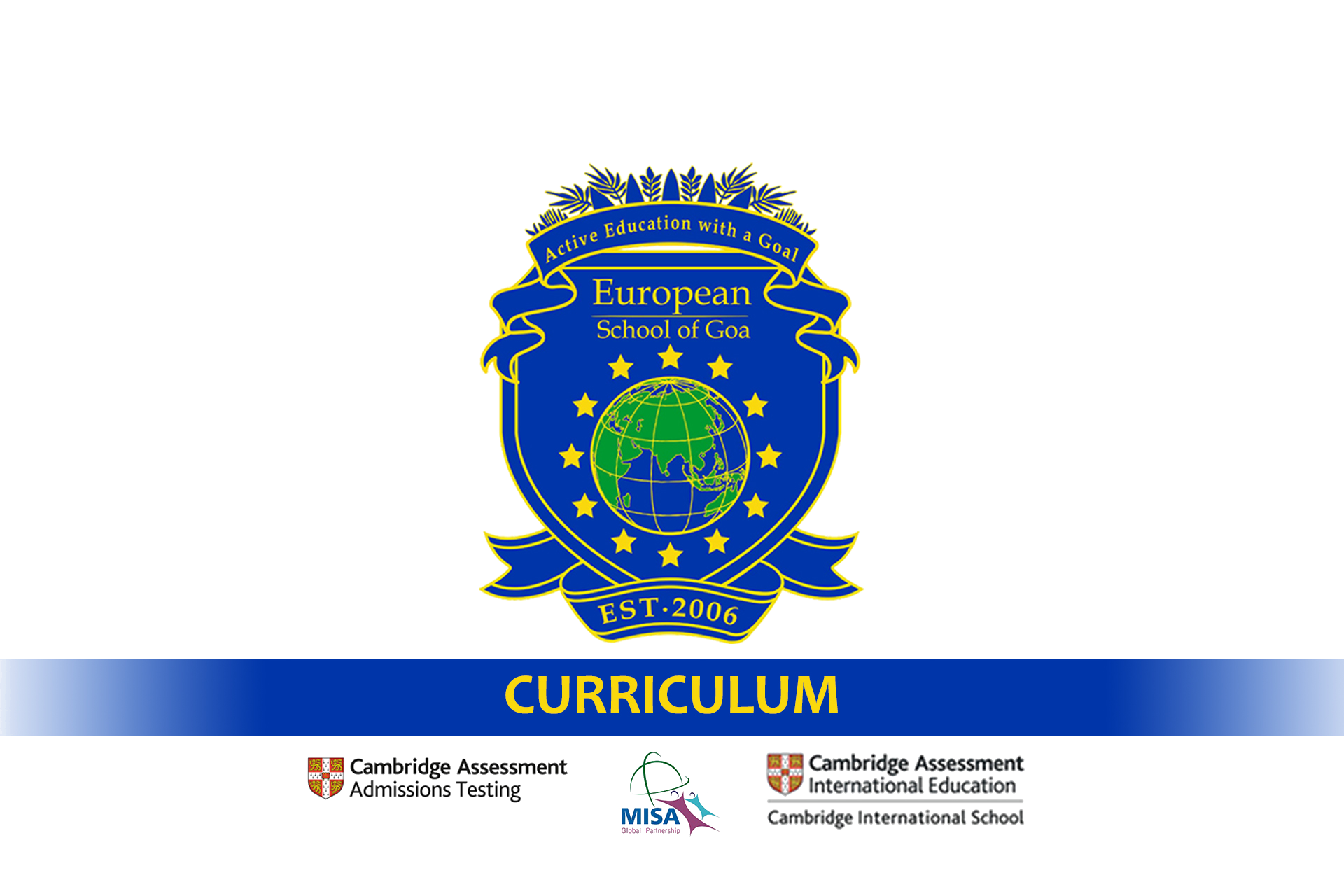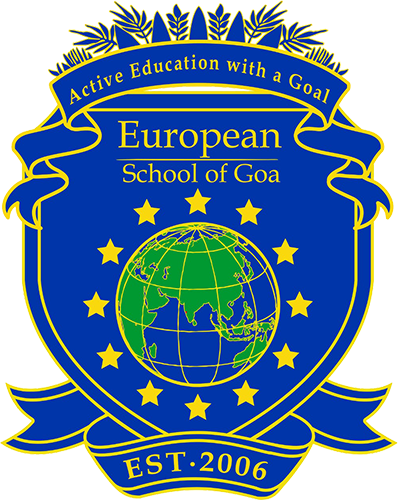
European School of Goa - Curriculum
Primary (Key Stage 1 & 2), Lower Secondary (Key Stage 3), Upper Secondary (Key Stage 4 - IGCSE), A1&A2 (Key stage 5) is where we start students – between the ages of 5 and 18 on an exciting educational journey.
British education is valued across the globe. That’s why, when it comes to our Primary, Secondary and Advanced Level, we follow the Cambridge International Education curriculum, which is based on the UK curriculum and a globally recognized and respected framework. The school curriculum provides a solid academic foundation while also preparing students to be global citizens and understand the world beyond their immediate surroundings.
The curriculum spans various stages of education, including Primary, Cambridge Lower Secondary, Cambridge IGCSE (Upper Secondary), and Cambridge International AS & A Levels. The curriculum is designed to be flexible, allowing us to adapt it to our specific needs and student populations.
ESG Curriculum - Key features include:
KS 1 & 2 Cambridge International Primary Curriculum (Years 1-6) : For learners aged 5 to 11 years
We use the Cambridge Primary Curriculum across our Lower Primary (Years 1 & 2) and Upper Primary (Years 3 - 6).
The primary curriculum based on the Cambridge Curriculum with an international twist. While the Cambridge curriculum formed its foundation, elements of international perspectives and practices are incorporated. This involves adding global issues, diverse cultures, international history and potentially multilingualism into the curriculum.
This stage focuses on foundational skills in core and foundations subjects preparing students for Secondary education. It develops skills and understanding in English, Mathematics, Sciences, Geography, History, Language Art, Home Economics, ICT, Short Story, Global Citizenship, Personal Social & Hygine education (PSHE), Modern Foreign Language (French/Spanish) and Art.
Assessment tools are built into Primary to help in identifying learners’ strengths and weaknesses, and monitor their development as they progress through Primary education.
KS 3 Cambridge Lower Secondary (Years 7-9) : For learners aged 11 to 14 years
Students in Key Stage 3 broadly follow the Cambridge curriculum, with some adaptations for our international context.Building on the foundation of Primary, this stage continues to develop knowledge and skills in core and foundation subjects, while also introducing other subjects like literature, Art & Design, Music, Sociology & Global Issues .
Cambridge IGCSE (Years 10-11): For learners aged 14 to 16 years
IGCSE stands for the International General Certificate of Secondary Education. It is a two-year programme leading to externally set, marked and certificated examinations from the University of Cambridge. Any student who takes an IGCSE subject will be gaining a qualification that is recognized globally. They are established qualifications that keep pace with educational developments and trends and so are an ideal foundation for higher level courses such as AS and A Levels and the International Baccalaureate Diploma. Students typically sit seven to nine subjects in one session at the end of Year 11.
Our school currently offers IGCSE courses in the following subjects :
- English Language, Maths, Science – Coordinated (2 IGCSEs) and French or Spanish.
- Students then have a choice of three of the following: Computer Science, Science – Separate (biology, Chemistry & Physics), Business Studies, History and Geography and Psychology subjects :
Please note that these are a guide. Our professional teachers will take each specification and tailor their delivery of the subject for the needs of the students and our school. Rest assured, whilst our teachers cannot predict the questions on these external exams, they will all be working hard to ensure each and every student is prepared for the exams at the end of each course.
Though it will not lead to an IGCSE qualification, students will also receive lessons in Global Citizenship, Personal Social & Health Education (PSHE), Physical Education (PE), Drama, Art and a monthly assembly.
“Please be aware that we do accept private candidates for IGSCE and AS/A Levels examinations.”
Alternatively students are offered ICE (International Certificate of Education), the highest certification for Secondary Education in the world.
Cambridge International GCE AS and Advanced Level (Years 12-13): For learners aged 16 to 18 years
A Level stands for Advanced Level and AS Level stands for Advanced Subsidiary Level. An AS Level (A1) contains half the content of the corresponding A Level and is normally completed in one year. This allows for flexibility, as learners can complete AS Levels as qualifications in their own right. Learners take all the assessments for their full A Level at the end of the second year (A2).
A1 takes place in Year 11 where students choose 3 subjects and take exams in each subject at the end to attain an AS-level. (AS levels equate to half an A-level).
A Levels are highly specialized and a student will normally take three subjects, although occasionally exceptional students take four or five. They are the ‘gold standard’ of Cambridge, and can act as entry qualifications by universities of the European Union and elsewhere around the world. A Level examinations are usually taken after 13 years of education and are based on approximately 360 hours of guided learning per subject, normally over a two year period.
Our school currently offers AS/A Level courses in the following subjects: Biology, Business, Chemistry, Computer Science, Economics, English Language, English General Paper, Geography, History, Information Technology, Mathematics, Law, Physics and Psychology subjects.
The Cambridge International A Level is reported on a grade scale from A* (highest) to E (minimum required performance). There is no A* grade for Cambridge International AS Levels, which run from grade A to E. Typical UK university entrance requirements are above three passes at grade C for academic courses in established universities. Very popular courses will often require higher grades.
For example, medical schools in the UK often require grades of AAB and the highly selective universities of Cambridge and Oxford ask for at least a combination of A and A* grades. Good A Level grades can also be a key to admission for all the world's major universities.
More Information:
If you would like to find out more about the qualifications, you can visit the website of the Cambridge Assessment International Education.
“Please be aware that we do accept private candidates for IGSCE and AS/A Levels examinations.”
Benefits of the Cambridge Curriculum:
- Global Recognition: Cambridge qualifications are recognized by universities and employers worldwide.
- Rigorous Academic Framework: The curriculum is designed to be academically rigorous, promoting critical thinking and problem-solving skills.
- Broad Foundation: The curriculum provides a broad foundation of knowledge and skills, preparing students for a variety of paths after secondary education.
- Progressive Learning: The curriculum is designed to be progressive, building on previous learning and providing a smooth transition between different stages of education.



 العربية
العربية
 English
English
